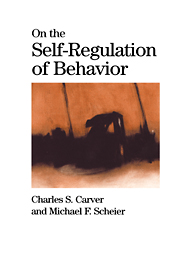Book contents
- Frontmatter
- Contents
- Preface
- Acknowledgments
- 1 Introduction and Plan
- 2 Principles of Feedback Control
- 3 Discrepancy-Reducing Feedback Processes in Behavior
- 4 Discrepancy-Enlarging Loops, and Three Further Issues
- 5 Goals and Behavior
- 6 Goals, Hierarchicality, and Behavior: Further Issues
- 7 Public and Private Aspects of the Self
- 8 Control Processes and Affect
- 9 Affect: Issues and Comparisons
- 10 Expectancies and Disengagement
- 11 Disengagement: Issues and Comparisons
- 12 Applications to Problems in Living
- 13 Hierarchicality and Problems in Living
- 14 Chaos and Dynamic Systems
- 15 Catastrophe Theory
- 16 Further Applications to Problems in Living
- 17 Is Behavior Controlled or Does It Emerge?
- 18 Goal Engagement, Life, and Death
- References
- Name Index
- Subject Index
9 - Affect: Issues and Comparisons
Published online by Cambridge University Press: 05 June 2012
- Frontmatter
- Contents
- Preface
- Acknowledgments
- 1 Introduction and Plan
- 2 Principles of Feedback Control
- 3 Discrepancy-Reducing Feedback Processes in Behavior
- 4 Discrepancy-Enlarging Loops, and Three Further Issues
- 5 Goals and Behavior
- 6 Goals, Hierarchicality, and Behavior: Further Issues
- 7 Public and Private Aspects of the Self
- 8 Control Processes and Affect
- 9 Affect: Issues and Comparisons
- 10 Expectancies and Disengagement
- 11 Disengagement: Issues and Comparisons
- 12 Applications to Problems in Living
- 13 Hierarchicality and Problems in Living
- 14 Chaos and Dynamic Systems
- 15 Catastrophe Theory
- 16 Further Applications to Problems in Living
- 17 Is Behavior Controlled or Does It Emerge?
- 18 Goal Engagement, Life, and Death
- References
- Name Index
- Subject Index
Summary
Our description of the affect model in Chapter 8 was intended to convey the essence of its ideas without letting you be distracted too readily into side issues. But questions naturally arise in thinking about those themes. Some questions pertain to the model itself and how it works, others pertain to the relation between this model and other approaches. In this chapter we address some of these matters, starting with questions about the model itself.
META-LEVEL STANDARDS
Consider first reference values at the meta level. Several questions can be raised about these values.
Meta-Level Standards Vary in Stringency
Most basically, what reference value does the meta system use? It depends on what behavior the person is engaged in. We assume the meta system can implement standards that vary widely across contexts. Sometimes the standard is demanding, sometimes less so. Sometimes it's imposed from outside (as when work has a deadline for completion), sometimes it derives from social comparison (as when people are in competition), sometimes it's self-imposed (as when someone has a personal timetable for career development). Regardless of origins, of course, the standard must be adopted by the person in order for it to have affective consequences.
An example where the meta standard is both stringent and externally imposed is degree programs in medical or law school. Even continuous behavioral progress (increments in mastery of material) is adequate only if it occurs at or above the rate required by the degree program.
- Type
- Chapter
- Information
- On the Self-Regulation of Behavior , pp. 148 - 170Publisher: Cambridge University PressPrint publication year: 1998



